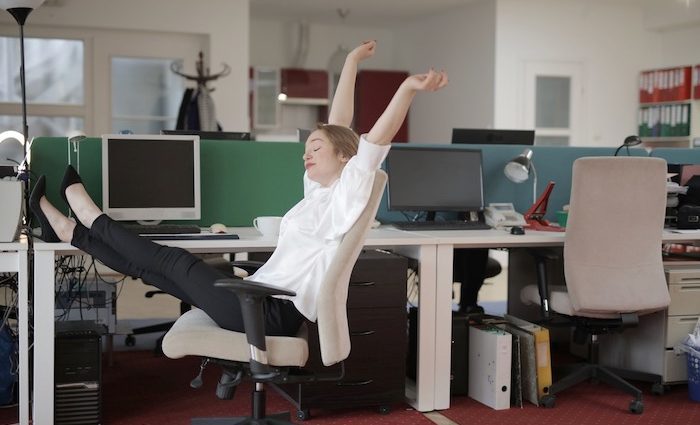by Karan Mahindru
If you’re a writer working from home—or if you spend several hours each day writing— your health may be paying the price.
Here are seven simple tips to help make sure that isn’t the case.
1. Stand Up and Stretch Every 30 Minutes Or So
Sitting for long periods is terrible for your body. Even if you’re simply standing up and walking around your home from time to time, this will keep your blood flowing and take the strain off your back.
Try to incorporate some light stretches while you walk around. They’ll help you get your body prepared for the strain of sitting down at your desk again.
Taking these short breaks is not only good for you physically, but it can also help you to be more mentally productive. Many writers use the “Pomodoro” technique, which usually involves 25 minutes of focused work followed by a 5-minute break.
Breaking your writing time into shorter intervals like this can help reduce writers’ block, as you’re not faced with the prospect of working for hours on end. You can also use the breaks to reward yourself with a short walk or cup of tea.
2. Avoid Straining Your Eyes and Wrists
Eye strain is an occupational hazard for anyone who spends long hours staring at a computer screen.
To combat this, make sure you take regular screen breaks by looking out of the window or just away from your monitor so that your eyes can focus at a further distance. You can install software on your computer to remind you to take these breaks. (Check here for some examples.)
Wrist strain and repetitive strain injuries like carpal tunnel syndrome are equally undesirable but a real risk if you’re doing a lot of typing.
To avoid straining your wrists, make sure your desk is set up ergonomically, with your chair at the right height for typing. Consider buying a laptop stand and external keyboard so that you can raise the screen to your eye level to avoid neck strain.
If your wrists are already suffering, you might need to take more drastic action. Give an automatic speech-to-text app a try. This will let you speak what you want to write instead of typing it.
3. Plan Your Writing Time Around a Workout Schedule
It’s easy to say that you don’t have time for exercise when you’re trying to write several thousand words a day, but it’s important that you find the time.
Thirty minutes spent on a morning workout will help to give you energy for the day and put you in a positive frame of mind. This will make you more productive and creative, which will more than make up for the half-hour you lose in work time.
Scheduling your workouts just as you would your deadlines makes you less likely to put them off. Treat yourself like your best client and prioritize a little time for exercise each day.
If you’ve never been the type of person who can work out in the morning, try to fit your workouts around the times of day when you’re least productive. You might try exercising after you’ve already worked for a few hours in the morning or at the end of the day to mark the transition from work to your evening routine.
4. Eat a Healthy Diet, Including Snacks!
It’s easy to eat junk food and unhealthy snacks when working from home. But if you want your body to be strong and capable of helping you stay in the “zone,” then try to eat a healthy diet that will promote brain function.
Make sure you eat plenty of fruits and vegetables and drink lots of water throughout the day. Include good sources of protein, complex carbohydrates, and healthy fats, and avoid processed junk food.
If you find that you tend to get sleepy after eating lunch, avoid eating lots of carb-heavy foods like bread. Instead, opt for something light and high in protein to keep your energy levels steady.
Snacks can be a great way to reward yourself for a writing sprint but avoid biscuits and other sugary snacks. Again, these can make your blood sugar levels spike and then crash, which will sap your energy (not to mention being bad for your waistline!). Instead, opt for nuts, cheese, or fruit.
5. Consider a Standing Desk
Long hours sitting down can take their toll on your body and mind, causing you to lose focus. A standing desk makes it easier for you to move around and encourages a healthy posture that will help with concentration.
If you’re used to working from a seated position, standing up will feel unnatural at first. Give yourself some time to adjust and build up your endurance in stages by alternating between sitting and standing positions.
If you can’t bear the idea of not having a chair to plop down on when the writing gets tough, consider sitting on an inflatable gym ball. This makes your core work harder than sitting in a chair and can help to prevent back pain. You can also bounce up and down or roll around a bit – any movement is better than none.
6. Avoid Caffeine in the Afternoon
Many writers simply can’t get started in the morning without a cup of coffee. Caffeine is proven to boost focus and creativity, so it can be a great writing aid. But you shouldn’t use it as a crutch.
It takes 10 hours for caffeine to leave your system. So, if you’re consuming it after midday, it is likely to affect your sleep. Too much caffeine can also cause headaches, irritability, and other undesirable side effects.
Getting a good night’s sleep is one of the best things you can do to stay healthy and productive, so it’s best to avoid caffeinated drinks completely in the afternoon.
7. Make Work-Life Balance a Priority
When you’re working from home, it’s difficult to draw a line between your work life and your home life. If you don’t focus on maintaining a healthy work-life balance, you’ll be tempted to write all day and neglect your family or other important obligations.
It’s often difficult to take a break from work, especially if you’re working for yourself and your income depends on how many hours you put in. But if you don’t take care of yourself, you’re going to get burned out and your work will suffer.
The only way to balance your responsibilities is by making time for yourself and those activities that promote physical and mental health. Stick to regular work times and make sure you take days off. Find some activities that are fun and give you energy so that when you return to your desk, you’re ready to dive back into work.
* * *
 Karan Mahindru is a keen content writer and avid traveler. He is passionate for developing financial freedom, traveling the world, and spreading his knowledge and expertise around accumulating wealth and adapting principles that will help you to improve your life, your productivity, and live the life you want to live.
Karan Mahindru is a keen content writer and avid traveler. He is passionate for developing financial freedom, traveling the world, and spreading his knowledge and expertise around accumulating wealth and adapting principles that will help you to improve your life, your productivity, and live the life you want to live.
Currently living in the beautiful Manly beach of Sydney, Australia. Karan loves anything and everything outdoors – going for swims, surfing, staying active, healthy and prioritizing his physical and mental health and wellbeing. Overall, Karan is driven and passionate about building and helping others in building a better and more fulfilling life.
Featured photo by Andrea Piacquadio from Pexels.


Yes, putting workouts in my calendar is a big help and I feel so much better when I get outside at some point in the day.
Snacks will always be a problem area for me, so I’m keeping a close eye on those.
Same here, Pauline, even in the frigid temps we have right now! Hope you have a happy and healthy 2022!